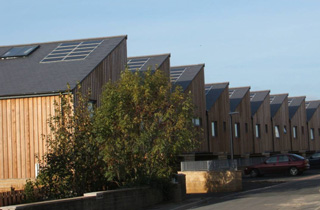Consumer Advice
Advice for consumers thinking of generating their own energy
RECC has produced the materials on this page to help you get what you want from small-scale renewable generation in your home.
Make sure you follow the Top Tips outlined below and in the animated video on the right. You might also like to read the full Consumer Guide below. You will then have the comfort of knowing that you have done all the necessary preparation and asked the right questions before you sign a contract. In this way you will not be 'taken for a ride' and you should end up with the system that is suitable for your situation and your needs, at a reasonable, competitive and transparent price.
Please note that RECC is not an insurance company. We are the administrator of the Renewable Energy Consumer Code. You will not be covered by insurance unless your installer has registered your installation with an insurance company or other provider. If you are in any doubt about this you should check with your installer.
Introduction
It is important that small-scale generation equipment is specified, installed and maintained correctly, not only for you as an individual consumer, of course, but also for the development of the renewable energy sector at large. Bad experiences will damage the reputation and credibility of the sector.
To ensure you have a good experience, you must know what to look out for. Of course most consumers are not technical experts, and nor do you need to be. But you do need accurate information and enough time to understand what it is you are buying. You must be clear about what your expectations are, and you should know the extent to which the generator(s) you are considering are capable of meeting them. In particular you should be clear about the typical price range and likely performance of the generator, and what this is likely to deliver for you in financial terms.
We recommend that you obtain at least three separate quotations before signing a contact. You should feel free to discuss any quotations you have received with your family and friends, and compare them with information available from third party sources. (The Government funds the Energy Saving Trust to provide objective, accurate information to consumers. You can find it here.

Why do you want to generate your own energy?
You may want to save the planet, save yourself money, enjoy the idea of generating your own electricity or heat or just show your neighbours how green you are. More likely it will be a combination of some or all of these. The bullet points below give you some things to consider. Broadly speaking, you will save more CO² emissions the higher up the list you plan to be.
- Heating your space and water using renewable instead of conventional electricity.
- Heating your space and water using renewable instead of oil-fired heating.
- Powering your lights and appliances with renewable instead of conventional electricity.
- Heating your space and water using renewable instead of gas-fired heating.
- Heating your space and water using combined heat and power instead of gas-fired heating.
Think about energy efficiency first
Whatever your motives for wanting to generate your own energy, you should think about energy efficiency first. You should make sure you are as energy efficient as possible, or you will end up wasting the precious renewable energy you go on to generate.
Understand your current energy usage
It helps if you have an idea of the amount of energy you use in your home. There are some useful on-line tools that help you calculate your usage taking into account your house-type and occupancy. You should make sure that you feed in the information about your actual consumption from your fuel bills (gas, electricity, oil &c.). Both gas and electricity usage are measured in kWh (kilowatt hours). It is important that you have an accurate idea of your total expenditure on energy before you install your own generator.
The company you are dealing with must provide you with written estimates of the anticipated performance of the generation system it recommends for you. They should make it clear whether it is based on data specific to your property, or whether it is based on a similar or ‘typical’ property. You should expect the company to be interested in your actual energy usage, and so lack of interest on their part should give you cause for concern.
You should compare this to your current total expenditure to calculate whether the generator will save you money and, if so, how much. Based on information about the Government’s incentive schemes, and some assumptions about interest rates and future energy prices, you can calculate the likely period it will take you to ‘pay back’ your up-front investment.
On 1 April 2010 the Government introduced the Feed-in Tariff for small-scale renewable electricity generators. For every unit of electricity you generate your supplier will pay you a certain ‘tariff’. For every unit of this you export back to the grid, they will pay you an additional ‘premium’. You can find information about the Feed-in Tariff here.
The Energy Saving Trust Cashback Calculator allows you calculate the likely return on your investment for installing a small-scale renewable electricity generator. You can find it here.
On 9 April 2014 the Government introduced the Renewable Heat Incentive (RHI) for the domestic market. This is for heat technologies mainly not on the gas grid. Consumers with such systems are, in most cases, paid based on the heat demand figure normally found on the Energy Performance Certificate for their property.
You can find out further information on the domestic RHI here.
The Government’s Domestic RHI Calculator can help those considering installing a renewable heat technology to work out what they may receive from the RHI. You can find it here.
Some general rules of thumb
Here are some important points to bear in mind before you sign a contract:
- If you are not on mains gas, then it is likely that you will get financial value from generating your own heat, for example from biomass heating, a ground- or an air-source heat pump or from solar thermal water heating.
- Remember that heating hot water generally accounts for about 30% of your total heating and hot water costs, while ‘space’ heating accounts for the remainder.
- If you have a large, un-shaded, predominantly south-facing roof space, you are fortunate as this is ideal for solar panels, either for heating water or for generating electricity. A south-west or west-facing roof would also be suitable, though a little less productive.
- If you are planning to build your own home, or extend your existing home, then again you are fortunate. It is cheaper to incorporate small-scale generation systems at the time you are building, rather than ‘retro’ fitting them later.
- If you’re considering installing a biomass boiler be sure you have a reliable source for, and somewhere to store, the wood / wood chips / wood pellets that will fuel it.
Heat pumps
If you’re considering installing a ground- or an air-source heat pump you should consider the following:
- make sure you take account of any additional work you need to do, such as drilling a vertical well or preparing a horizontal trench in which to lay a ‘slinky’ or a straight tube
- remember that the feasibility of drilling is highly dependent on the geology of the ground under and around your property
- make sure that the pump and the heat exchanger are correctly sized to take account of your property size and location, its energy efficiency and air tightness and – very importantly – whether you intend heat your hot water as well as your ‘space’
- remember that heat pumps work best with under floor heating so you need to factor this into the cost; if you use radiators, they need to be large ones since the heat produced will be low in temperature.
- remember that if the air temperature outside is freezing or below, an air source heat pump might work less efficiently.
- make sure you obtain an accurate estimate of your likely annual electricity usage after the heat pump has been installed. Heat pumps require electricity to run, and must be specified correctly for the property they are to be installed in to work efficiently, otherwise energy bills can be high.

What to expect from the company you’re dealing with
You should ensure that the company you are dealing with is a member of the Renewable Energy Consumer Code. You can check that here.
You should also ensure that the company is certified by the MCS, the Government’s product and installer certification scheme. You can check that here.
You should read the Renewable Energy Consumer Code before you sign a contract and make sure that the company has complied fully with the Code in its dealings with you. If they have not you should ask them why not. One of the most important sections of the Consumer Code concerns high-pressure selling techniques. The company’s advertising material should not be ambiguous, misleading or untruthful. It should not attack or discredit other products. When you do sign a contract make sure you are not required to pay more than 25% of the final contract price as a deposit.
Companies’ representatives should deal with you in a courteous, constructive and prompt manner, and they should show you evidence of their identification before they enter your home, including their name and their job title. Do not sign a contract with a company whose representative:
- stays in your home for more than two hours (except in exceptional circumstances)
- offers you a high initial price followed by a discount
- offers you a discount for signing the contract that day
- offers you a discount for monitoring performance or providing testimonials
- withholds price information until the end of the visit or ask you what other quotations you have already received
- claims that there is limited availability of the product.
Once you have installed your energy generator why not tell us how you found the experience? You can give us feedback either on-line on using hard copy here.
If you wish to log a complaint about one of our members you can do that here.